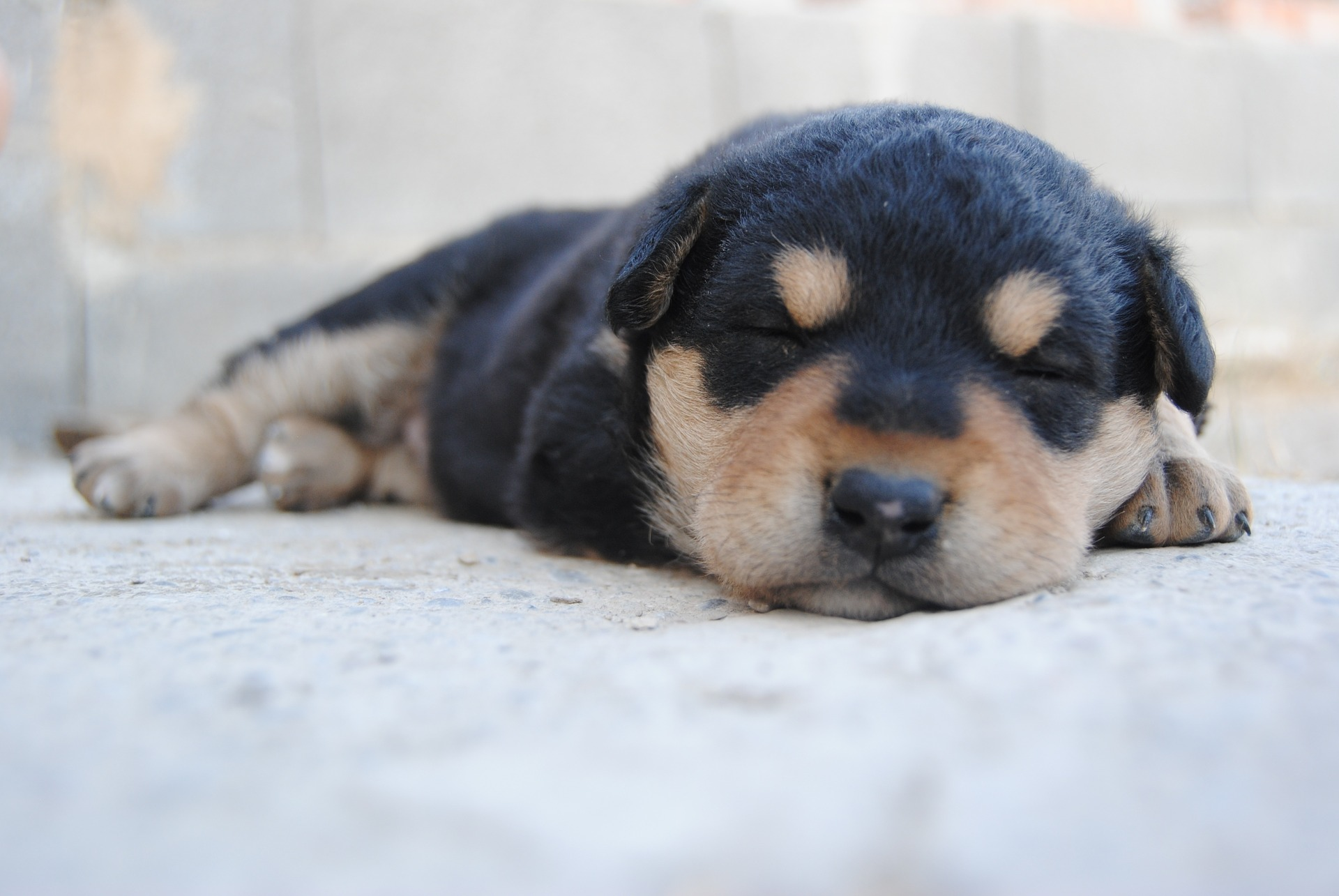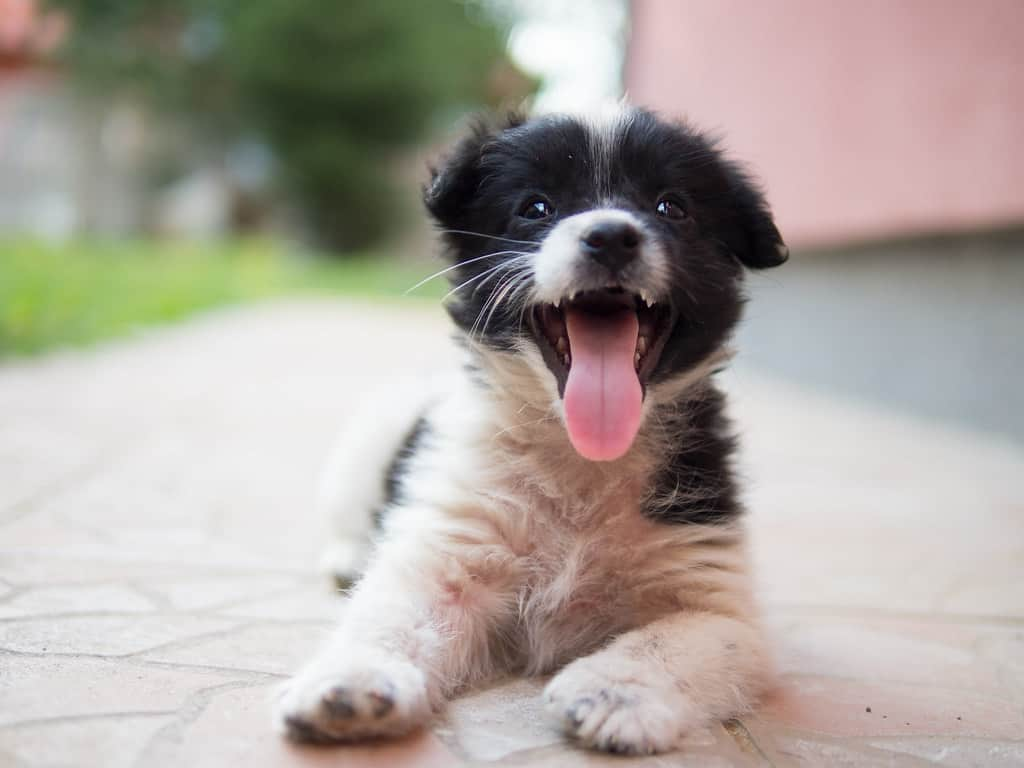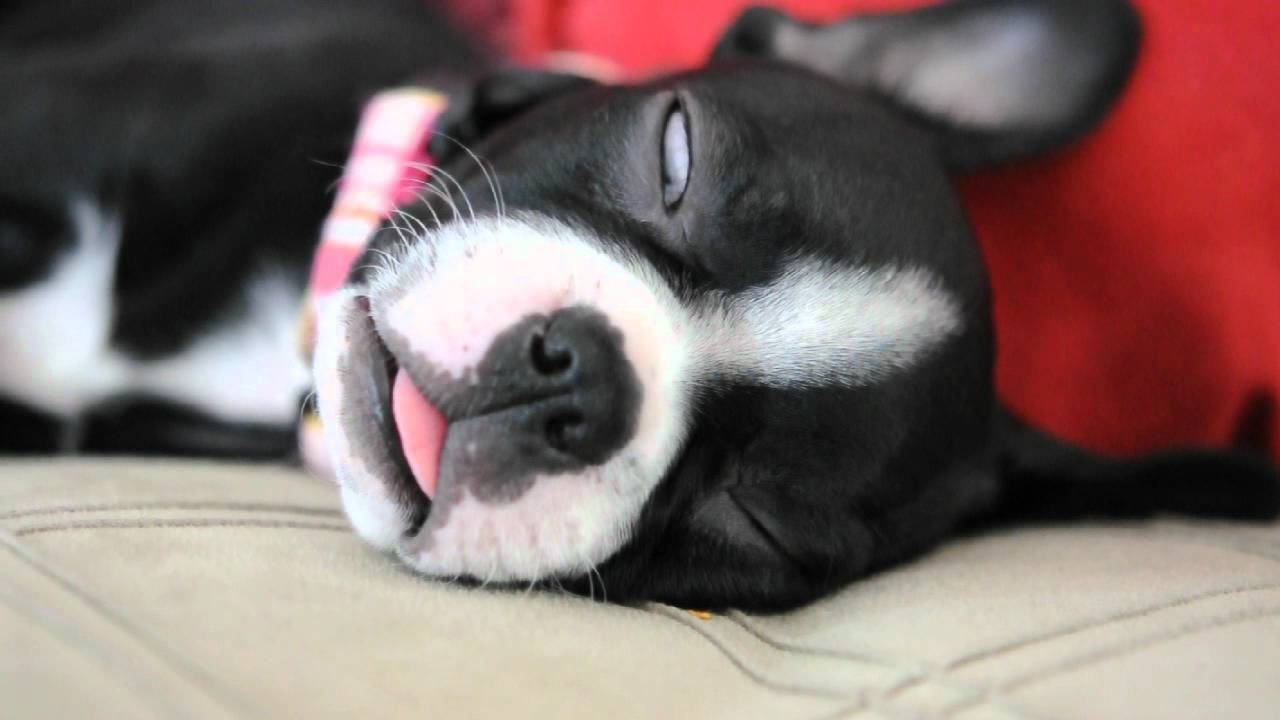Puppy Breathing Fast While Sleeping – Is It OK and Reasons

Have you ever watched your sleeping puppy and noticed how fast they breathe sometimes? As a veterinarian, I often meet puppy parents who are worried about this very observation.
It’s understandable to be concerned – after all, your puppy is a beloved member of your family.
But let me reassure you, in many cases, a puppy breathing fast while sleeping is perfectly normal and part of their growth process.

In this guide, we’ll explore the fascinating world of puppy development, particularly focusing on their breathing patterns and reasons for puppy breathing fast while sleeping.
You’ll learn about the differences between normal and abnormal, why the puppy breathing quickly while sleeping, and when it’s time to consult a vet.
Key Takeaways
- Sometimes puppy breathing fast while sleeping is perfectly normal. This is because they’re growing quickly and it happens a lot during their dream sleep.
- If a puppy is breathing rapidly all the time, even when awake, and seems tired or sick, this is not normal. In such cases, it’s important to take them to see a vet.
- Keep an eye on how your puppy breathes and acts. Also, make sure they live in a clean and safe place. This helps them stay healthy.
- If you’re worried about your puppy’s breathing or health, especially if they show other signs of being unwell, you should talk to a vet for a physical examination. They can give the best advice and care.
Understanding Normal Puppy Physiology
Basics of Puppy Development
Unlike adult dogs, puppies undergo rapid growth and development in their first few months of life, which significantly impacts their physiological functions, including breathing.
Unlike adult dogs, puppies have a much higher metabolic rate, necessitating a faster respiratory rate to gain more oxygen to meet their body’s oxygen demands. That’s why they breathe fast while sleeping.
This rapid development phase also means that their bodily systems, including the respiratory system, are still maturing.

Respiratory System Development
According to the Animal Emergency Centre, the Puppy’s respiration rate is faster as the respiratory system of a puppy is not as fully developed as an adult dog’s. Puppies usually breathe faster than dog’s breathing.
Their lungs and airways are smaller, and the muscles involved in breathing are not yet at their full strength to get more oxygen.
Dog breathing fast when respiratory rate is more than 40 breaths per minute. This difference in development explains why puppies breathe faster than adult dogs breathing.
According to the Merck Veterinary Manual, the normal respiratory rate can range between 18 to 34 breaths per minute, but this can vary depending on the size of the breed and individual differences.
Puppies, like humans, can exhibit fast breathing while sleeping for various reasons. Some of the common reasons for puppy breathing fast while sleeping include:
- REM Sleep: Rapid Eye Movement (REM) sleep is a phase of sleep where dreams occur, and it’s characterized by rapid and irregular breathing. Puppies, like adult dogs, may experience REM sleep, which can lead to fast breathing during this stage.
- Normal Development: Puppies grow and develop rapidly, and their bodies are often in a state of flux. This can result in fast breathing as they undergo physical and neurological changes.
- Temperature Regulation: Puppies may increase their breathing rate to help regulate their body temperature. This is especially common in small or young puppies who may have difficulty regulating their body temperature.
- Dreams and Physical Activity: Puppies often dream during sleep, and these dreams can lead to increased movement and faster breathing as they react to what they’re experiencing in their dreams.
- Anxiety or Stress: Just like humans, puppies can experience anxiety or stress, which can lead to faster breathing during sleep. It could be triggered by changes in their environment, separation from their mother or littermates, or new experiences.
- Illness or Discomfort: If a puppy is not feeling well or is experiencing discomfort due to digestive issues, pain, or illness, they may breathe more rapidly during sleep as their body tries to cope with these issues.
- High Activity Levels: Puppies are generally very active during their waking hours, and this physical activity can affect their breathing rate even when they are asleep. Puppies who have been playing energetically may continue to breathe quickly as they settle down to rest.
The Science of Sleep in Puppies
According to the canine journal, Just like humans, puppies go through different stages of sleep, including REM (Rapid Eye Movement) and non-REM sleep. The REM stage is particularly important when puppies experience most of their dreaming.
During REM sleep, it’s common for puppies to breathe rapidly, twitch, and even whine or bark, as their brain activity is high.

Puppy Dreaming
Dreaming is a normal part of a puppy’s sleep cycle, and it is during these dreams that you might notice irregular or rapid breathing. This dreaming phase is crucial for their mental development and helps in processing their daily experiences.
The rapid breathing observed during this stage is typically no cause for concern and is a natural part of their sleep cycle.
Differentiating Normal and Abnormal Breathing
Characteristics of Normal Fast Breathing
The Puppy’s fast breathing is usually rhythmic and doesn’t involve any sounds of distress. It can often be observed during their deep sleep phases, especially after a day of activities and learning.
This type of breathing should not persist once the puppy wakes up and becomes active again.
Signs of Abnormal Breathing
According to vets now, Labored breathing, on the other hand, might include labored or noisy breathing, continuous fast breathing even while awake, or signs of distress like coughing or wheezing.
If the fast breathing is accompanied by other symptoms like lethargy, loss of appetite, or pale gums, the pet’s chest rises, it could indicate a more serious issue and warrants immediate veterinary attention.
Common Causes of Abnormal Breathing in Puppies
Respiratory Infections and Allergies
One common cause of more rapid breathing while sleeping in puppies is respiratory infection. These can range from mild to severe health concerns and often present symptoms like coughing, sneezing, nasal discharge, and fever and can change puppy sleeping patterns.
Allergic reactions can also cause breathing difficulties, characterized by sneezing, itching, and sometimes breathing difficulties.
Congenital Heart Conditions
Some puppies are born with congenital heart conditions that can affect their breathing due to congestive heart failure. Signs that might suggest a heart problem include persistent fast breathing, fatigue, coughing, and sometimes, a bluish tinge to the gums.
Early diagnosis and management are crucial for puppies with heart conditions.
Other Medical Conditions
Other underlying health issues like pneumonia, bronchitis, or even parasites can affect a dog’s breathing and deviate from resting respiratory rate. Each of these conditions has specific symptoms and requires a different approach to diagnosis and treatment.
When to Visit the Vet
Assessing Urgency
Understanding when to seek veterinary help is crucial. If a puppy exhibits fast breathing along with other symptoms like coughing, lethargy, or a change in appetite, it’s time to consult a vet. Any change in gum color or difficulty breathing should be treated as an emergency.
Preparation for the Vet Visit
When planning a visit to the vet, it’s helpful to have as much information as possible. Keep a record of the puppy’s breathing pattern, any other symptoms observed, and the puppy’s general behavior and appetite.
If possible, a video recording of the puppy’s heavy breathing can be very useful for the veterinarian.
Home Monitoring and Care
Monitoring Techniques
Monitoring your puppy’s respiratory rate is straightforward: count how many breaths (one inhale and exhale equals one breath) your puppy takes in one minute when they are calm and resting. Keeping a regular log of this can help identify any changes or trends over time.
Creating a Healthy Environment
Ensuring a healthy living environment can significantly impact your puppy’s respiratory health. This includes maintaining a clean, dust-free living space, avoiding exposure to smoke or other irritants, and providing a stress-free and comfortable resting area.
Conclusion
To wrap up, it’s usually okay for puppies to breathe fast while they are sleeping. This fast breathing is a normal part of how they grow. It’s important to know that puppies breathe fast during certain sleep stages, like when dreaming.
But, if your puppy is breathing fast all the time, even when awake, or shows signs of being unwell like coughing or acting tired, you should take them to the vet.
As a puppy owner, watching how your puppy breathes and acts is important. Keeping their living area clean and safe helps them stay healthy. If you’re ever worried about your puppy’s breathing or health, it’s always a good idea to talk to a vet.
They can give you special advice and help if needed. Remember, knowing about your puppy’s health and being watchful is the best way to take care of them.
Frequently Asked Questions (FAQs)
1. Is it normal for my puppy to breathe fast while sleeping?
Yes, it’s normal for puppies to breathe fast while sleeping. This is often part of their growth and happens especially during certain sleep stages like REM, where they might be dreaming.
2. What is the normal breathing rate for puppies?
A normal pet’s breathing rate for puppies can range from 15 to 40 breaths per minute. However, this can vary depending on the puppy’s size and breed.
3. Should I be worried if puppies breathe faster all the time?
If your puppy breathe fast not only while sleeping but also when awake, and shows other signs like coughing, being tired, or not eating well, you should consult a vet for full physical examination.
4. Can dreaming affect my puppy’s breathing?
Yes, when puppies dream during REM sleep, they may breathe faster. This is a normal part of their sleep and development.
5. What are the signs of abnormal respiration in puppies?
It includes labored or noisy breathing, trouble breathing, fast breathing even when awake, kennel cough, wheezing, or changes in gum color. These signs call for a vet visit.
6. What could cause puppies to breathe abnormally?
Causes can include respiratory infections, heart disease allergies, congenital heart conditions, pneumonia, heart failure, bronchitis, or parasites. Each condition needs a specific treatment.
